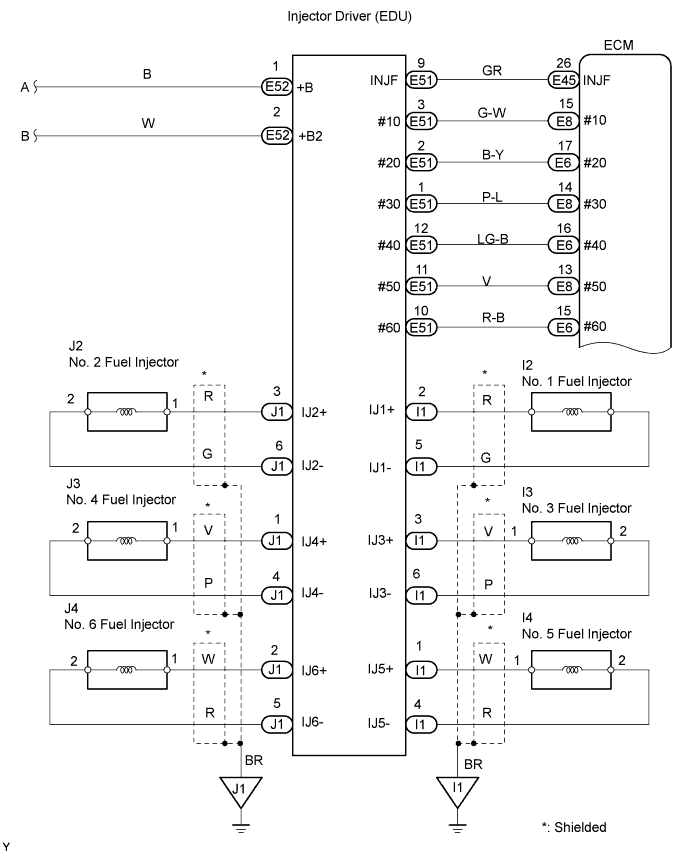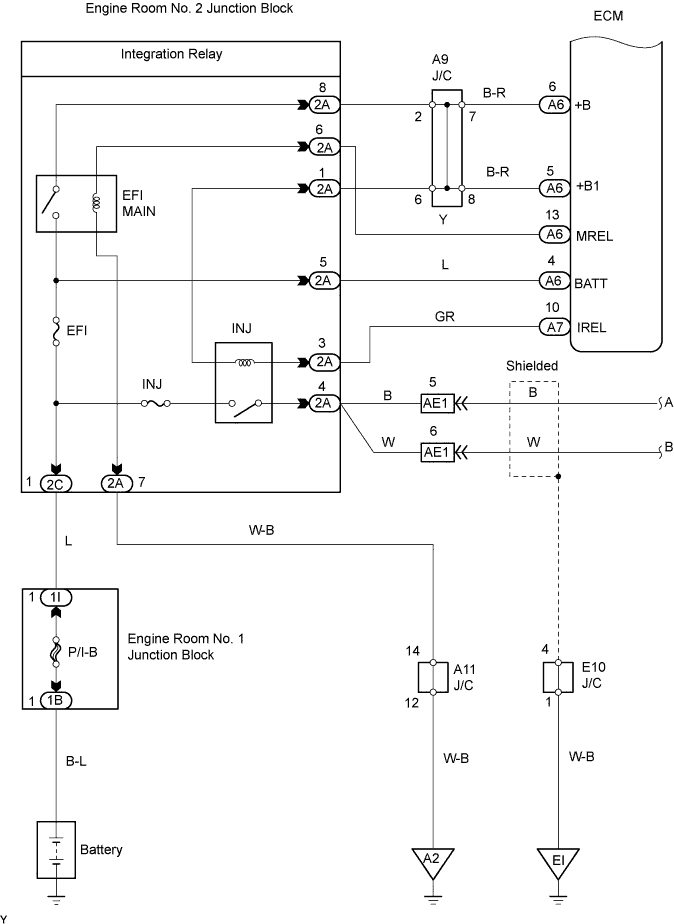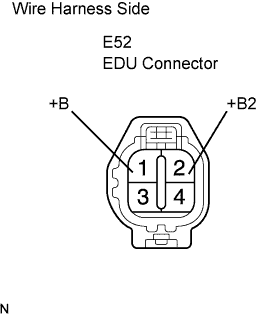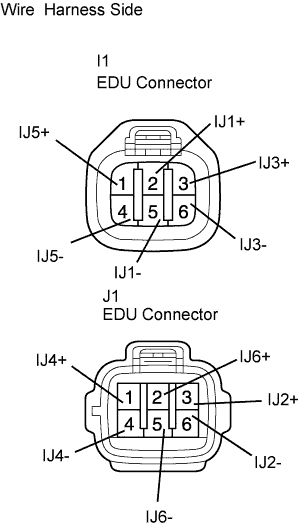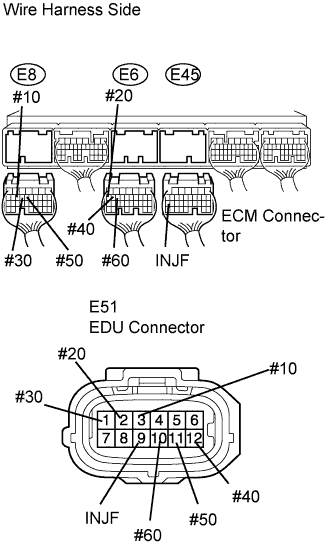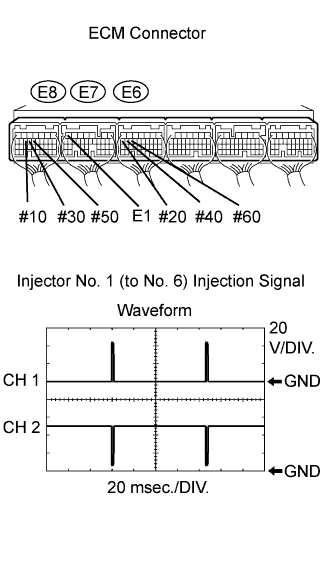Dtc P0200 Injector Circuit / Open
Engine. Lexus Gs430, Gs300. Uzs190 Grs190
DESCRIPTION
WIRING DIAGRAM
INSPECTION PROCEDURE
INSPECT INJECTOR DRIVER (POWER SOURCE OF EDU)
CHECK HARNESS AND CONNECTOR (EDU - FUEL INJECTOR)
CHECK HARNESS AND CONNECTOR (ECM - EDU)
CHECK ECM (#10, #20, #30, #40, #50 AND #60 VOLTAGE)
CHECK ECM (INJF VOLTAGE)
INSPECT FUEL INJECTOR ASSEMBLY
DTC P0200 Injector Circuit / Open |
DTC P0201 Injector Circuit / Open - (Cylinder 1) |
DTC P0202 Injector Circuit / Open - (Cylinder 2) |
DTC P0203 Injector Circuit / Open - (Cylinder 3) |
DTC P0204 Injector Circuit / Open - (Cylinder 4) |
DTC P0205 Injector Circuit / Open - (Cylinder 5) |
DTC P0206 Injector Circuit / Open - (Cylinder 6) |
DTC P12FF Electric Driver Unit |
DESCRIPTION
The high speed activation of the high pressure fuel injector is possible through the high-voltage, rapid-recharge DC/DC converter. Using high pressure fuel, the atomized fuel's injection timing can be accurately controlled, which decreases emissions and fuel consumption. The steady ECM checks the injector driver (EDU) movement. When the injector driver (EDU) or inject has a malfunction, the injection control of the relevant cylinder is stopped or power to the INJ relay is cut. Then the ECM illuminates the MIL. The high speed activation of the high pressure fuel injector is possible through the high-voltage, rapid-recharge DC/DC converter. Using high pressure fuel, the atomized fuel's injection timing can be accurately controlled, which decreases emissions and fuel consumption. The steady ECM checks the injector driver (EDU) movement. When the injector driver (EDU) or inject has a malfunction, the injection control of the relevant cylinder is stopped or power to the INJ relay is cut. Then the ECM illuminates the MIL.DTC No.
| DTC Detection Condition
| Trouble Area
|
P0200
| - NO INJF signals to ECM despite crankshaft rotating 10 times (1 trip detection logic)
- NO INJF signals to ECM despite crankshaft rotating 20 times during cranking (2 trip detection logic)
| - Open or short in EDU circuit
- EDU (Injector driver)
- Fuel injector assembly
- ECM
|
P0201
P0202
P0203
P0204
P0205
P0206
P12FF
| NO INJF signals of each cylinder to ECM 20 times successively (1 trip detection logic)
| - Open or short in EDU circuit
- EDU (Injector driver)
- Fuel injector assembly
- ECM
|
WIRING DIAGRAM
INSPECTION PROCEDURE
- HINT:
- Read freeze frame data using the intelligent tester. Freeze frame data records the engine conditions when malfunctions are detected. When troubleshooting, freeze frame data can help determine if the vehicle was moving or stationary, if the engine was warmed up or not, if the air-fuel ratio was lean or rich, and other data from the time the malfunction occurred.
| 1.INSPECT INJECTOR DRIVER (POWER SOURCE OF EDU) |
Disconnect the E52 EDU connector.
Turn the engine switch on (IG).
Measure the voltage between the specified terminals of the EDU connector.
- Standard voltage:
Tester Connection
| Specified Condition
|
+B (E52-1) - Body ground
| 9 to 14 V
|
+B2 (E52-2) - Body ground
| 9 to 14 V
|
Reconnect the EDU connector.
| | CHECK EDU POWER SOURCE CIRCUIT |
|
|
| 2.CHECK HARNESS AND CONNECTOR (EDU - FUEL INJECTOR) |
Disconnect the I1 and J1 connectors.
Measure the resistance between the specified terminals of the EDU connector.
- Standard resistance:
Tester Connection
| Specified Condition
|
IJ1+ (I1-2) - IJ1- (I1-5)
| 2.01 to 2.31 Ω at 20°C (68°F)
|
IJ2+ (J1-3) - IJ2- (J1-6)
| 2.01 to 2.31 Ω at 20°C (68°F)
|
IJ3+ (I1-3) - IJ3- (I1-6)
| 2.01 to 2.31 Ω at 20°C (68°F)
|
IJ4+ (J1-1) - IJ4- (J1-4)
| 2.01 to 2.31 Ω at 20°C (68°F)
|
IJ5+ (I1-1) - IJ5- (I1-4)
| 2.01 to 2.31 Ω at 20°C (68°F)
|
IJ6+ (J1-2) - IJ6- (J1-5)
| 2.01 to 2.31 Ω at 20°C (68°F)
|
Reconnect the EDU connector.
| 3.CHECK HARNESS AND CONNECTOR (ECM - EDU) |
Disconnect the E6, E8 and E45 ECM connectors.
Disconnect the E51 EDU connector.
Measure the resistance between the wire harness side connectors.
- Standard resistance (Check for open):
Tester Connection
| Specified Condition
|
#10 (E8-15) - #10 (E51-3)
| Below 1 Ω
|
#20 (E6-17) - #20 (E51-2)
| Below 1 Ω
|
#30 (E8-14) - #30 (E51-1)
| Below 1 Ω
|
#40 (E6-16) - #40 (E51-12)
| Below 1 Ω
|
#50 (E8-13) - #50 (E51-11)
| Below 1 Ω
|
#60 (E6-15) - #60 (E51-10)
| Below 1 Ω
|
INJF (E45-26) - INJF (E51-9)
| Below 1 Ω
|
- Standard resistance (Check for short):
Tester Connection
| Specified Condition
|
#10 (E8-15) or #10 (E51-3) - Body ground
| 10 kΩ or higher
|
#20 (E6-17) or #20 (E51-2) - Body ground
| 10 kΩ or higher
|
#30 (E8-14) or #30 (E51-1) - Body ground
| 10 kΩ or higher
|
#40 (E6-16) or #40 (E51-12) - Body ground
| 10 kΩ or higher
|
#50 (E8-13) or #50 (E51-11) - Body ground
| 10 kΩ or higher
|
#60 (E6-15) or #60 (E51-10) - Body ground
| 10 kΩ or higher
|
INJF (E45-26) or INJF (E51-9) - Body ground
| 10 kΩ or higher
|
Reconnect the ECM connector.
Reconnect the EDU connector.
| | REPAIR OR REPLACE HARNESS OR CONNECTOR |
|
|
| 4.CHECK ECM (#10, #20, #30, #40, #50 AND #60 VOLTAGE) |
Connect an oscilloscope to terminals #10 to #60 and E1 of the E6, E7 and E8 ECM harness side connectors.
With the engine cranking or idling, check the signal waveform.
- Standard voltage:
- Signal waveform appears as shown in the illustration.
ECM Terminal Name
| CH1: #10 (E8-15) - E1 (E7-7)
CH1: #20 (E6-17) - E1 (E7-7)
CH1: #30 (E8-14) - E1 (E7-7)
CH1: #40 (E6-16) - E1 (E7-7)
CH1: #50 (E8-13) - E1 (E7-7)
CH1: #60 (E6-15) - E1 (E7-7)
|
Tester Range
| 20 V/DIV., 20 msec./DIV.
|
Condition
| Idling after warming up engine
|
- HINT:
- Check the waveform before the ECM detects the DTC(s) and enters the fail-safe mode, because the ECM will no more indicate the output voltage once it enters the fail-safe mode.
| 5.CHECK ECM (INJF VOLTAGE) |
Connect an oscilloscope to terminals INJF and E1 of the E7 and E45 ECM harness side connectors.
With the engine cranking or idling, check the signal waveform.
- Standard voltage:
- Signal waveform appears as shown in the illustration.
ECM Terminal Name
| CH2: INJF (E45-26) - E1 (E7-7)
|
Tester Range
| 20 V/DIV., 20 msec./DIV.
|
Condition
| Idling after warming up engine
|
- HINT:
- Check the waveform before the ECM detects the DTC(s) and enters the fail-safe mode, because the EDU will no more indicate the output voltage once it enters the fail-safe mode.
| OK |
|
|
|
| CHECK FOR INTERMITTENT PROBLEMS |
|
| 6.INSPECT FUEL INJECTOR ASSEMBLY |
| | REPLACE FUEL INJECTOR ASSEMBLY |
|
|
| OK |
|
|
|
| REPAIR OR REPLACE HARNESS OR CONNECTOR |
|
